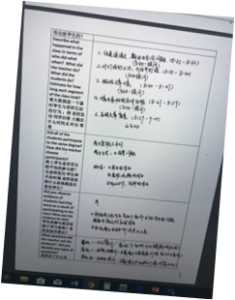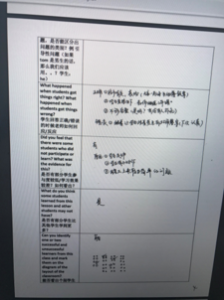
By Andrea Abbas
Professor of the Sociology of Higher Education
Co-Director of Centre for Educational Research in China and East Asia (CRECEA)
My Chinese and UK based partners and I hope that the collaboratively developed classroom observation sheets shown below will eventually underpin a wider set of materials that teachers and educators in Chinese schools will find useful to understand and develop their existing knowledges and practices so that they better facilitate participation and success for all children who attend their schools. We also hope that using them focuses attention on access. In the international community the term inclusive education is used to describe the issues we are trying to address in our project. However, if global educational justice is to be achieved it is likely this term would need to be changed (Chan‐Tiberghien, 2004).

Inclusive education is now increasingly associated with the agendas and practices of ‘Education for All’ a concept and policy term which underpins UNESCO’s (2019) approach to inclusion. This suggests that compulsory education globally should be adapted so that it accommodates all children to access, participate and become successful through compulsory schooling (Haug, 2017).

Over the past three years, through three interrelated projects, I have joined with Chinese and European colleagues in focusing on effective participation and trying to find out how best to support Chinese educators to develop inclusive educational curricula for training teachers to work inclusively in Chinese classrooms. In doing this we have engaged, implicitly and explicitly, with the core problems that have become associated with the important agenda of inclusive education.
The observation sheets have been developed with colleagues at Sichuan Normal University over the past year and they formed a central part of a strategy to try to develop knowledge contextually and collaboratively. Dr Rui Li , Dr Yuhan Xie, Paul Gao, a doctoral student at Bath and I developed the observation sheets together over several meetings and exchanges and in consultation with Masters students. We worked with 40 Chinese Masters students who are training teachers at Sichuan Normal University who volunteered to use the sheets to gather data and to give us feedback on their value. They are still a work in progress. We have 167 of these completed observations and our analysis and interpretation of these will then inform the further development of the observation sheet and a set of reding materials and instructions which are intended to support, in school projects, to improve effective participation by all students.
Transferring the concepts and practices of inclusion from the global north into other contexts has been notoriously difficult. Indeed, Messiou (2017) implies that there is already too much research describing such failures and that we need to do research that is critical and transformative. This is something we are aspiring to with the observation sheet and materials.
The notion of inclusion/exclusion has been conceptualised and developed in the social, economic, political, intellectual and educational contexts of the global north (most significantly Europe, North America and Australia) where they have anyway had limited success (Haug, 2017). Whilst these knowledges and practices regarding inclusion can be stimuli for debates and the development of ideas for countries beyond the global north, they arguably ‘colonise’ the minds of scholars outside of the global north who begin to cast their own knowledge and practices as inferior or outdated and in need of becoming more like the global north (Chen, 2010). Different religious, cultural, social, economic, ed ucational and political contexts require diverse approaches and solutions to in relation to the unique issues they face. In China, left behind children, who stay in rural contexts, often with grandparents, whilst their parents migrate to the city for economic reasons, have educational problems that are unique to their background and emerge from the context of trying to engage with Chinese classrooms and systems.
The observation sheet and the pack that accompanies it will be designed to encourage teachers to identify the forms of educational exclusions that exist in their context and to see how students who are affected by these engage in classes that are unique to the Chinese system: are the students themselves identifiable to the training teacher; do they know where they are positioned in the rows of seats that all face the front; how do any left-behind children engage with the questioning style and in any activities, and so forth. The packs we are developing are designed for whole school or partial school projects. They will include materials from Chinese literature and global northern literature that can help to unpack critically the issues believed to be behind each observational question. In our development engaging with them has stimulated research training teachers to develop and take on projects relating to disengagement and disadvantage in the classroom and beyond.
We have also tried to engage with problems arising from the way that Western epistemologies and practices are usually promoted and taken on in global educational policy with insufficient attention to practices and approaches from other contexts. The effectiveness, role and value of the historical policies, the epistemologies, knowledges and existing practices that countries from outside the global north have developed are automatically considered inferior and irrelevant (see Singhal, 2006 and Walton, 2018 for a discussion of this in relation to disability). This sense that knowledges from the global north are superior is difficult to erode because it is a universal and implicit belief almost globally embedded. The sense that the most legitimate and highly valued knowledge is from the global north results in such scholars (and artefacts associated with them: universities, books, journals etc.), especially English language ones, receiving excessive attention and over influencing. Hence, we need tools and practices to change the dialogue away from the idea of transferring a set of superior concepts and practices from the global north to China.
Tasks such as co-designing an observation sheet and the associated materials has and will help us to focus on and prioritise the context and the generation of knowledge for improving things there. Whilst there are many difficulties and factors working against this in practice, using the sheets and focusing on what lenses are needed for training teachers to see what is going on in Chinese classrooms, gives more primacy to the views of Chinese educators and is intended to start a process of locally generated knowledge but with the idea that this can inform a global pool of knowledge and practice.
Our dialogues has driven us to understand the relevance of context and its history and has lead us to investigate how local interpretations and enactments of national policies have been different. How different relational cultures affect how inclusion is enacted. It is but a small effort not to impose the inclusive epistemologies, knowledges and practices from the north so that they lead to what Santos (2016) calls epistemicide (the eradication of indigenous epistemologies/practices/knowledges). The tool we are developing will be furthered trialled by three schools in the Shanghai region.
References
Chan‐Tiberghien, J.* (2004) Towards a ‘global educational justice’ research paradigm: cognitive justice, decolonizing methodologies and critical pedagogy. Globalisation, Societies and Education, 2:2, 191-213, DOI: 10.1080/14767720410001733647
Chen, K. H. (2010) Asia as Method: Toward Deimperialization. Durham (NC), Duke University Press, 2010, 342pp
Haug, P. 2017. Understanding inclusive education: ideals and reality. Scandinavian Journal of Disability Research, 19(3), pp.206–217. DOI: http://doi.org/10.1080/15017419.2016.1224778
INCLUTE (2019) http://www.inclute.eu/events/ accessed 19th January 2020.
Messiou, K. (2017) Research in the field of inclusive education: time for a rethink?, International Journal of Inclusive Education, 21:2, 146-159, DOI: 10.1080/13603116.2016.1223184
Santos, Boaventura de Sousa. (2014). Epistemologies of the South: Justice Against Epistemicide. Boulder: Paradigm Publishers,
Smith, L.T. (2012) Decolonising Methodologies: Research and Indigenous Peoples (2nd Edition), London: Zed Books.
Walton, Elizabeth (2018) Decolonising (through) inclusive education? Educational Research for Social Change, 7 . pp. 31-45.